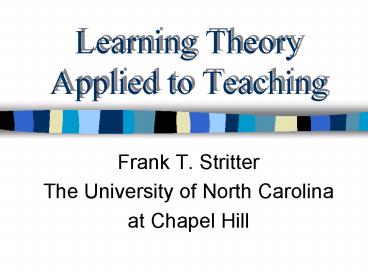Learning Theory Applied to Teaching - PowerPoint PPT Presentation
1 / 18
Title:
Learning Theory Applied to Teaching
Description:
Learning is a persisting change in an individual's understanding, ... Incompetence. Conscious. Incompetence. Unconscious. Competence. Conscious. Competenceb ... – PowerPoint PPT presentation
Number of Views:178
Avg rating:3.0/5.0
Title: Learning Theory Applied to Teaching
1
Learning Theory Applied to Teaching
- Frank T. Stritter
- The University of North Carolina
- at Chapel Hill
2
Goals for Today
- State names of the five theories
- Describe each theory briefly
- Think about the role of theory
3
What is learning?
- Learning is a persisting change in an
individuals understanding, performance or
potential brought about by meaningful
interaction with his/her environment.
4
What is Learning?
Unconscious Incompetence
Conscious Incompetence
Unconscious Competence
Conscious Competenceb
5
What is a theory?
- Principle that guides
- Specifies instructors activities which
bring about learning
6
Learning Theories
- Behavioral
- Cognitive
- Constructivist
- Humanistic
- Developmental
7
Behavioral
- B. F. Skinner
- Change in observable behavior
- Objectives written by instructor
- Instructor provides stimulus, asks for response
and reinforces - Learner in third person
8
Instructional Strategies
- Provide specific objectives
- Expect learners to move at own pace
- Provide information, ask for response
- Present material in small steps
- Assess learner frequently
- Provide immediate feedback which is
both positive and corrective - Revise instruction based on data
9
Cognitive
- Bruner, Ausubel, Gagne
- Learning is meaningful connection to and
organization of memory - Objectives are general
- Instructor arranges conditions and helps learner
develop structure - Learner in third person
10
Instructional Strategies
- Assess learners prerequisite skills
- Use advance organizers
- Provide structure, examples, images
- Connect new concepts to previous
- Ask learner to form own questions
- Ask What if..? questions
- Be as concerned with thought process as with the
right answer
11
Constructivist
- Albert Bandura
- Learning is a mutual understanding developed by
participating in a learning community - Objectives developed together
- Instructor sets example and reacts
- Learner in first person
12
Instructional Strategies
- Base learning on practical experience
- Ask learners for their hypotheses
- Model performance, problem solving
- Help learners generate links
- Facilitate discussions
- Emphasize cooperation, collaboration
- Assess learning in context
13
Humanistic
- Rogers, Knowles
- Learning is satisfying ones own needs
- Objectives developed by learner
- Instructor reacts to learners needs
- Learner in first person
14
Instructional Strategies
- Develop learning contract with learner
- Help learners make choices
- Incorporate learners prior experience
- Ask learners to present to each other
- Guide discussions
- Ask learner to evaluate own learning
- Serve as consultant
15
Developmental
- Jean Piaget
- Learning is maturation
- Learning occurs in stages
- Objectives based on norms
- Diagnose stage and react
- Learner changes from third to first
16
Instructional Strategies
- Determine learners stage
- Keep growth chart
- Emphasize discovery of principles
- Help learner accept responsibility
- Change teaching style
- Directing to facilitating to consulting
17
Points of AgreementBetween Theories
- Goals are important
- Simple to complex
- Learner must be active
- Reinforcement
- Group support
- Attitude toward learning and context
18
My Advice
- Systematic design - B
- How learning occurs - Cog
- Interactions with others - Con
- Adjusting instruction - D
- Self-determination - H































